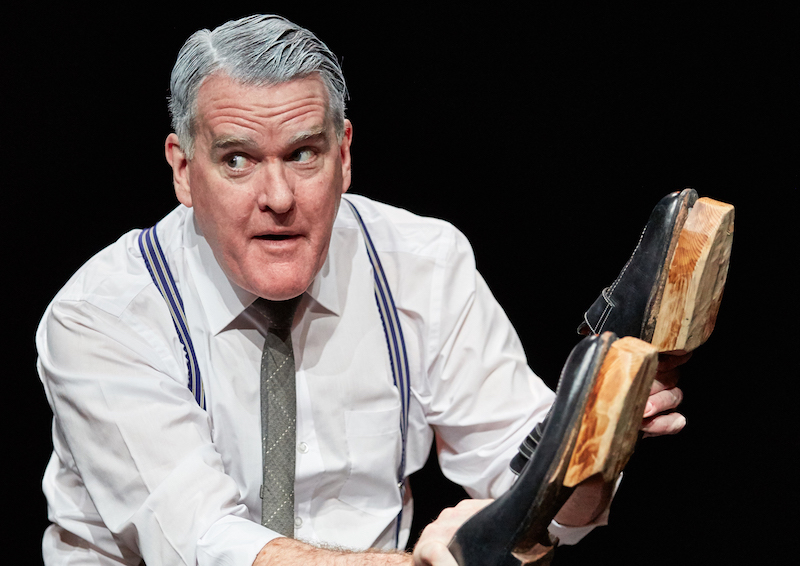In seeking to understand the historic, divisive and to some bewildering Brexit vote, I will turn to theatre. Through my regular exposure to it, I can number among my ever-widening acquaintance a young king, a whistleblower, a minimum-wage movie usher, a recovering alcoholic, a passionate teacher, a grieving parent, a struggling miner, an evangelical preacher, an underpaid social worker, a dementia sufferer, and a pair of star-crossed lovers.
Theatre is empathy incarnate. It is one of the greatest tools we have for reaching another person, understanding their point of view, coming to realise that difference is a gift, and that there are still myriad connections between us. In a country dangerously divided by region, age, ethnicity, and deeply held beliefs, in a world fracturing and building new walls, theatre is not a luxury: it’s a necessity.
 One of my most joyous recent experiences was Mikel Murfi’s The Man in the Woman’s Shoes at Tricycle Theatre (pictured right by Mark Douet). The extraordinary Irishman plays a mute cobbler who literally walks in other people’s shoes, and whose silence makes him a receptacle for their thoughts and feelings. The piece was commissioned for a Sligo Arts festival celebrating creativity in older age groups and giving voice to those society pushes to the margins. It’s a reminder that those who shout loudest aren’t the only ones worth listening to, and that no one should be left behind.
One of my most joyous recent experiences was Mikel Murfi’s The Man in the Woman’s Shoes at Tricycle Theatre (pictured right by Mark Douet). The extraordinary Irishman plays a mute cobbler who literally walks in other people’s shoes, and whose silence makes him a receptacle for their thoughts and feelings. The piece was commissioned for a Sligo Arts festival celebrating creativity in older age groups and giving voice to those society pushes to the margins. It’s a reminder that those who shout loudest aren’t the only ones worth listening to, and that no one should be left behind.
Both Remain and Leave camps bear some guilt here, failing to engage with and understand those who disagree with them, or who have been suffering in quiet desperation. It’s easy to feel angry, and I do. Betrayed. Scared. Embarrassed. But perhaps the saddest loss in this vicious campaign is our collective humanity – the ability to look beyond our own immediate concerns to what might be affecting someone else. Into this void must step artists. Storytellers tear down walls. They can, have and will change the world.
Theatre is increasingly a place where no one is made to feel like the OtherOf course, the horrible irony is that at a time when we most need the arts, our beleaguered sector is likely to suffer further economic setbacks, loss of European funding, and challenges to international artistic exchanges. Regional theatres, vital platforms for voiceless communities and opportunities to broaden horizons, will suffer most. It’s not enough to explore diversity in thriving metropolitan centres like London. We must avoid becoming an echo chamber, and seek to engage audiences of every region, class, race, gender, sexuality, religion, age and economic circumstance.
The biggest theatrical hit right now – and possibly for years to come – is the Harry Potter play (main picture). It springs from a book series that advocates tolerance, not prejudice, courage in the face of uncertainty, not fear and victimisation. My generation grew up with those books, as well as taking for granted our multicultural identities – I’m British, and also the product of Canadian, Italian, Polish and Czech immigrants. Theatre, increasingly a place where no one is made to feel like the Other, has helped me to embrace every facet of who I am.
What can we do now, post-Brexit? Offer empathetic outlets for communication and self-expression, as the Royal Court already has with its More In Common tumblr. Use this most collaborative of media to collectively find hope for a way forward. Continue to tell stories, to share ideas, to believe in one another and our capacity for progress. Like it or not, we’re facing a new world. We must not let the loudest voices dictate a narrower version of it. Every voice matters, and we must take care to listen to them.















Add comment